except用法
except except for beside的区别

except except for beside的区别摘要:1.引言:except,except for,beside的区别概述2.except用法详解3.except for用法详解4.beside用法详解5.总结:except,except for,beside在日常写作中的运用正文:在日常英语写作中,except,except for和beside这三个词组都有一定的使用频率。
虽然它们在某些情况下可以互换使用,但它们之间仍有明显的区别。
本文将详细介绍这三个词组的用法及其区别。
首先,让我们来看看except和except for的区别。
1.except用法except意为“除……之外”,它用于从某个整体中排除某些人或事物。
例如:I like all fruits, except oranges.(我喜欢所有的水果,除了橙子。
)2.except for用法except for意为“除了……以外”,它强调对某个事物的轻微修正或补充。
例如:The room is perfect, except for the color of the walls.(房间很完美,除了墙的颜色。
)接下来,我们来看看except和beside的区别。
3.beside用法beside意为“在……旁边”,它用于描述某人或某物所在的位置。
例如:He is sitting beside me.(他坐在我旁边。
)4.except和beside在日常写作中的运用在实际写作中,except和beside可以用来表示不同的概念。
except用于表示排除,而beside用于表示位置关系。
因此,正确选择这两个词组对于清晰表达作者的意图至关重要。
总之,except,except for和beside这三个词组在英语写作中有明显的区别。
except和except for主要用于表示排除,而beside主要用于表示位置关系。
在实际写作中,根据所需表达的含义,选择合适的词组是非常重要的。
英语 except 和 except for的区别
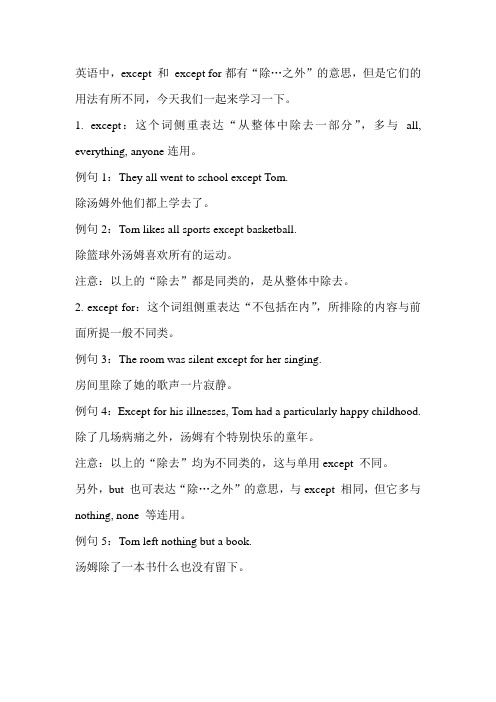
英语中,except 和except for都有“除…之外”的意思,但是它们的用法有所不同,今天我们一起来学习一下。
1. except:这个词侧重表达“从整体中除去一部分”,多与all, everything, anyone连用。
例句1:They all went to school except Tom.
除汤姆外他们都上学去了。
例句2:Tom likes all sports except basketball.
除篮球外汤姆喜欢所有的运动。
注意:以上的“除去”都是同类的,是从整体中除去。
2. except for:这个词组侧重表达“不包括在内”,所排除的内容与前面所提一般不同类。
例句3:The room was silent except for her singing.
房间里除了她的歌声一片寂静。
例句4:Except for his illnesses, Tom had a particularly happy childhood. 除了几场病痛之外,汤姆有个特别快乐的童年。
注意:以上的“除去”均为不同类的,这与单用except 不同。
另外,but 也可表达“除…之外”的意思,与except 相同,但它多与nothing, none 等连用。
例句5:Tom left nothing but a book.
汤姆除了一本书什么也没有留下。
辨析except,exceptfor(that),besides
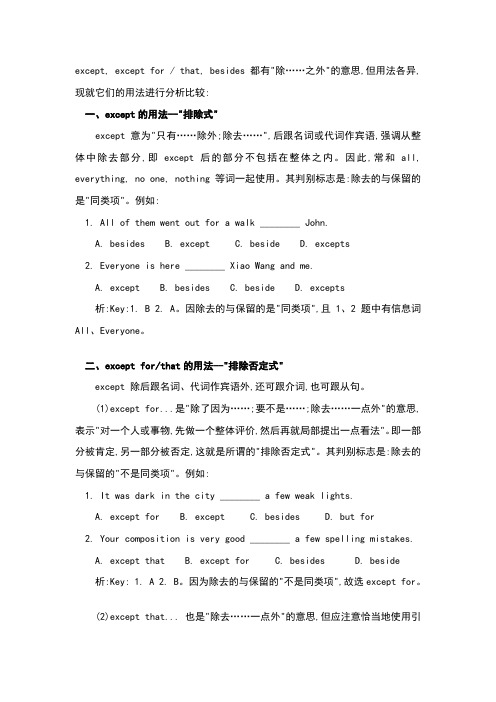
except, except for / that, besides都有"除……之外"的意思,但用法各异,现就它们的用法进行分析比较:一、except的用法--"排除式"except意为"只有……除外;除去……",后跟名词或代词作宾语,强调从整体中除去部分,即except后的部分不包括在整体之内。
因此,常和all, everything, no one, nothing等词一起使用。
其判别标志是:除去的与保留的是"同类项"。
例如:1. All of them went out for a walk ________ John.A. besidesB. exceptC. besideD. excepts2. Everyone is here ________ Xiao Wang and me.A. exceptB. besidesC. besideD. excepts析:Key:1. B 2. A。
因除去的与保留的是"同类项",且1、2题中有信息词All、Everyone。
二、except for/that的用法--"排除否定式"except 除后跟名词、代词作宾语外,还可跟介词,也可跟从句。
(1)except for...是"除了因为……;要不是……;除去……一点外"的意思,表示"对一个人或事物,先做一个整体评价,然后再就局部提出一点看法"。
即一部分被肯定,另一部分被否定,这就是所谓的"排除否定式"。
其判别标志是:除去的与保留的"不是同类项"。
例如:1. It was dark in the city ________ a few weak lights.A. except forB. exceptC. besidesD. but for2. Your composition is very good ________ a few spelling mistakes.A. except thatB. except forC. besidesD. beside析:Key: 1. A 2. B。
except和except for区别
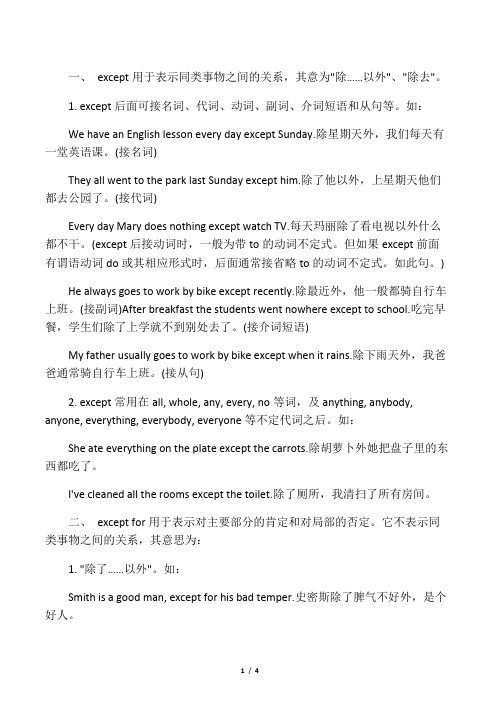
一、except用于表示同类事物之间的关系,其意为"除……以外"、"除去"。
1. except后面可接名词、代词、动词、副词、介词短语和从句等。
如:We have an English lesson every day except Sunday.除星期天外,我们每天有一堂英语课。
(接名词)They all went to the park last Sunday except him.除了他以外,上星期天他们都去公园了。
(接代词)Every day Mary does nothing except watch TV.每天玛丽除了看电视以外什么都不干。
(except后接动词时,一般为带to的动词不定式。
但如果except前面有谓语动词do或其相应形式时,后面通常接省略to的动词不定式。
如此句。
)He always goes to work by bike except recently.除最近外,他一般都骑自行车上班。
(接副词)After breakfast the students went nowhere except to school.吃完早餐,学生们除了上学就不到别处去了。
(接介词短语)My father usually goes to work by bike except when it rains.除下雨天外,我爸爸通常骑自行车上班。
(接从句)2. except常用在all, whole, any, every, no等词,及anything, anybody, anyone, everything, everybody, everyone等不定代词之后。
如:She ate everything on the plate except the carrots.除胡萝卜外她把盘子里的东西都吃了。
I've cleaned all the rooms except the toilet.除了厕所,我清扫了所有房间。
except和except for区别
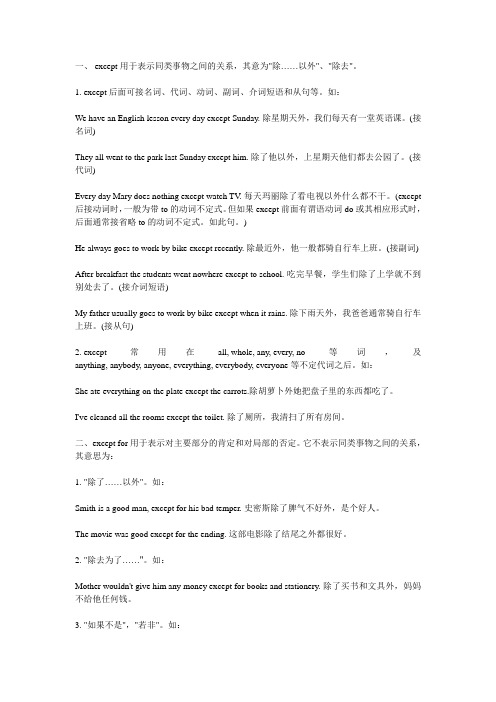
一、 except用于表示同类事物之间的关系,其意为"除……以外"、"除去"。
1. except后面可接名词、代词、动词、副词、介词短语和从句等。
如:We have an English lesson every day except Sunday. 除星期天外,我们每天有一堂英语课。
(接名词)They all went to the park last Sunday except him. 除了他以外,上星期天他们都去公园了。
(接代词)Every day Mary does nothing except watch TV. 每天玛丽除了看电视以外什么都不干。
(except 后接动词时,一般为带to的动词不定式。
但如果except前面有谓语动词do或其相应形式时,后面通常接省略to的动词不定式。
如此句。
)He always goes to work by bike except recently. 除最近外,他一般都骑自行车上班。
(接副词)After breakfast the students went nowhere except to school. 吃完早餐,学生们除了上学就不到别处去了。
(接介词短语)My father usually goes to work by bike except when it rains. 除下雨天外,我爸爸通常骑自行车上班。
(接从句)2. except常用在all, whole, any, every, no等词,及anything, anybody, anyone, everything, everybody, everyone等不定代词之后。
如:She ate everything on the plate except the carrots.除胡萝卜外她把盘子里的东西都吃了。
I've cleaned all the rooms except the toilet. 除了厕所,我清扫了所有房间。
except的用法

except的用法except有除非;除了 ... 之外;若不是等意思,那么你知道except 的用法吗?下面跟着一起来学习一下,希望对大家的学习有所帮助!except的用法大全:except的用法1:except用作介词可表示“除…之外”,通常指所排除的事物不在所述范围之内,后面可接名词或代词。
except的用法2:except可接反身代词、副词、介词短语或状语从句,也可接(省略to的)动词不定式、动名词、基数词,还可接that 或wh-从句。
except的用法3:except用作及物动词时的基本意思是“把…除外”。
引申可指“免除”,一般接人作宾语,且通常用于否定结构。
except的用法4:except与介词to或against连用,意为“反对…”; 与介词for连用表示“不包括在…之内”。
except的用法例句:1. He hadn't eaten a thing except for one forkful of salad.除了一餐叉色拉,他什么都没吃。
2. She sipped the wine. Everything was hazy now, except for Nick's face.她小口地抿着酒。
现在一切都变得模糊起来,除了尼克的脸。
3. Except for the remarkably tidy kitchen, the place was a mess.除了厨房特别干净外,这地方一片狼藉。
4. I sold everything I owned except for my car and my books.我把我所有的东西都卖掉了,只剩下汽车和书。
5. The snow, except where it drifted, was only calf-deep.除了吹得堆积起来的地方,雪只有小腿肚深。
关于except的用法及解释

关于except的用法及解释except在英语中是比较常见的一个单词,那么大家对于except的的相关知识了解多少呢?知道except的用法是什么吗?下面是小编给大家带来的关于except的用法及解释_except的用法和例句,以供大家参考,我们一起来看看吧!except的用法一、except作为介词1.除…之外,除了Everyone is ready except him.除了他,大家都准备好了.He won't work except when he is pleased.只有在高兴时他才会工作.二、except作为及物动词除去,把…除外except certain names from a list 在名单中除去某些人的名字except sb from a group 把某人从团体中开除nobody excepted 无一人例外present company excepted 在场者除外.三、except作为不及物动词1.反对conj.( 连接词 conjunction )1.【口】除外,只有I would go,except it's too far.我是要去,可是路太远了.2.【古·圣】除非except ye be born again 除非尔等再生.▼except的语法一、except的用法--"排除式"except意为"只有……除外;除去……",后跟名词或代词作宾语,强调从整体中除去部分,即except后的部分不包括在整体之内。
因此,常和all, everything, no one, nothing等词一起使用。
其判别标志是:除去的与保留的是"同类项"。
例如:1. All of them went out for a walk ________ John.A. besidesB. exceptC. besideD. excepts2. Everyone is here ________ Xiao Wang and me.A. exceptB. besidesC. besideD. excepts析:Key:1. B 2. A。
exceptexcept for 和 excepting 用法辨析

Except,except for 和excepting 用法辨析我们知道,except, except for和excepting都有"除……外"的意思,但在用法上却有所不同。
现将其分述如下:一、except用于表示同类事物之间的关系,其意为"除……以外"、"除去"。
1. except后面可接名词、代词、动词、副词、介词短语和从句等。
如:We have an English lesson every day except Sunday. 除星期天外,我们每天有一堂英语课。
(接名词)They all went to the park last Sunday except him. 除了他以外,上星期天他们都去公园了。
(接代词)Every day Mary does nothing except watch TV. 每天玛丽除了看电视以外什么都不干。
(except后接动词时,一般为带to的动词不定式。
但如果except前面有谓语动词do或其相应形式时,后面通常接省略to的动词不定式。
如此句。
)He always goes to work by bike except recently. 除最近外,他一般都骑自行车上班。
(接副词)After breakfast the students went nowhere except to school. 吃完早餐,学生们除了上学就不到别处去了。
(接介词短语)My father usually goes to work by bike except when it rains. 除下雨天外,我爸爸通常骑自行车上班。
(接从句)2. except常用在all, whole, any, every, no等词,及anything, anybody, anyone, everything, everybody, everyone等不定代词之后。
except和besides的区别
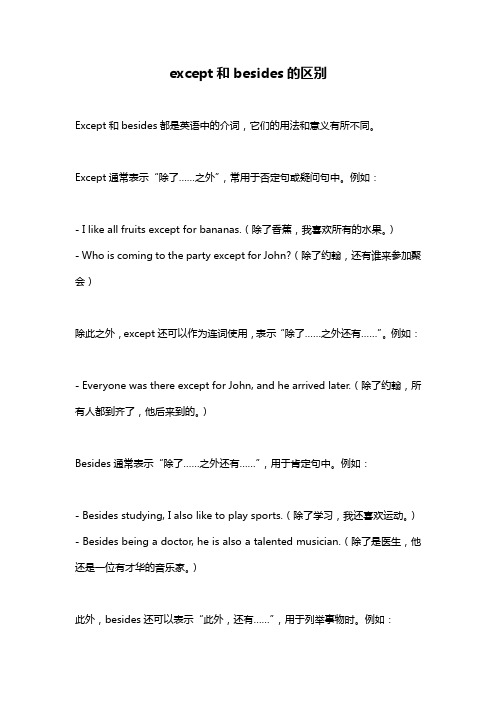
except和besides的区别
Except和besides都是英语中的介词,它们的用法和意义有所不同。
Except通常表示“除了……之外”,常用于否定句或疑问句中。
例如:
- I like all fruits except for bananas.(除了香蕉,我喜欢所有的水果。
)
- Who is coming to the party except for John?(除了约翰,还有谁来参加聚会)
除此之外,except还可以作为连词使用,表示“除了……之外还有……”。
例如:
- Everyone was there except for John, and he arrived later.(除了约翰,所有人都到齐了,他后来到的。
)
Besides通常表示“除了……之外还有……”,用于肯定句中。
例如:
- Besides studying, I also like to play sports.(除了学习,我还喜欢运动。
)- Besides being a doctor, he is also a talented musician.(除了是医生,他还是一位有才华的音乐家。
)
此外,besides还可以表示“此外,还有……”,用于列举事物时。
例如:
- Besides apples and oranges, we also have bananas and grapes.(除了苹果和橘子,我们还有香蕉和葡萄。
)
总的来说,except和besides都可以表示“除了……之外”,但是except更常用于否定句或疑问句中,而besides更常用于肯定句和列举事物时。
except的用法总结大全
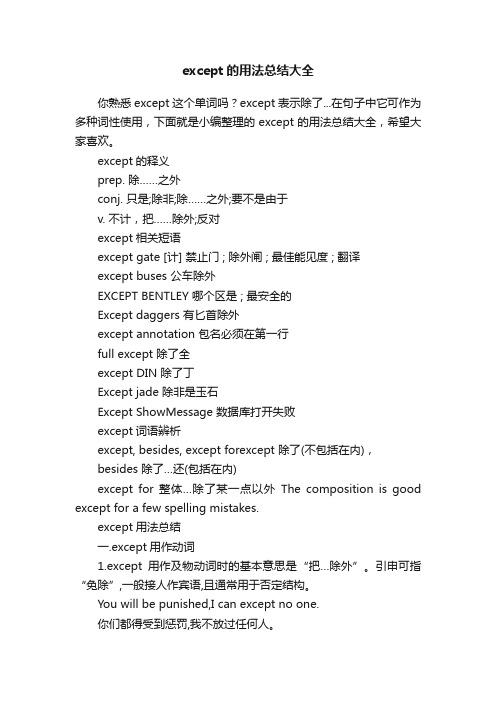
except的用法总结大全你熟悉except这个单词吗?except表示除了...在句子中它可作为多种词性使用,下面就是小编整理的except的用法总结大全,希望大家喜欢。
except的释义prep. 除……之外conj. 只是;除非;除……之外;要不是由于v. 不计,把……除外;反对except相关短语except gate [计] 禁止门 ; 除外闸 ; 最佳能见度 ; 翻译except buses 公车除外EXCEPT BENTLEY 哪个区是 ; 最安全的Except daggers 有匕首除外except annotation 包名必须在第一行full except 除了全except DIN 除了丁Except jade 除非是玉石Except ShowMessage 数据库打开失败except词语辨析except, besides, except forexcept 除了(不包括在内),besides 除了…还(包括在内)except for 整体…除了某一点以外The composition is good except for a few spelling mistakes.except用法总结一.except用作动词1.except用作及物动词时的基本意思是“把…除外”。
引申可指“免除”,一般接人作宾语,且通常用于否定结构。
You will be punished,I can except no one.你们都得受到惩罚,我不放过任何人。
All the students are late, not excepting John.所有学生都迟到了,约翰也不例外。
2.except与介词to或against连用,意为“反对…”; 与介词for连用表示“不包括在…之内”。
二.except用作介词1.except用作介词可表示“除…之外”,通常指所排除的事物不在所述范围之内,后面可接名词或代词。
except except for beside的区别

except except for beside的区别摘要:1.引言:except,except for,beside的区别2.except用法详解3.except for用法详解4.beside用法详解5.总结:except,except for,beside在日常写作中的应用正文:在日常英语写作中,except,except for和beside这三个短语都有排除或除外的意思,但它们的用法和含义略有不同。
在这篇文章中,我们将详细解析这三个短语的区别,并探讨如何在写作中恰当地使用它们。
首先,我们来看except和except for的用法。
except的意思是“除…之外”,它用于从整体中排除某个部分。
except for则表示“除了…之外”,主要用于对某个事物进行修正或补充。
例如:1.except:All the students except Tom attended the party.(除汤姆外,所有学生都参加了派对。
)2.except for:The cake was delicious except for the frosting.(除了奶油外,蛋糕非常美味。
)接下来,我们来探讨beside这个短语的用法。
beside的意思是“在…旁边”,用于表示位置或方向的并列。
例如:3.beside:She sat down beside me and started talking to me.(她坐在我旁边开始和我聊天。
)总之,except,except for和beside在写作中有不同的用法和含义。
except和except for用于表示排除或例外,而beside则用于表示并列关系。
在日常生活和学习中,我们可以根据实际情况选择合适的短语来表达我们的意思。
牛津英语Except,except for和excepting用法辨析
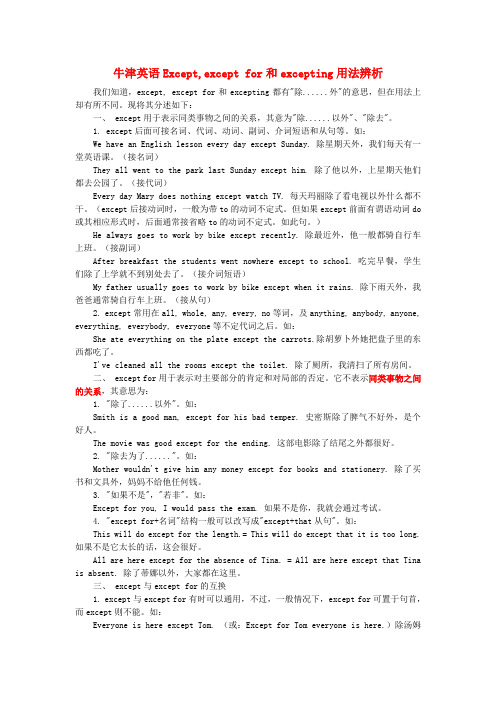
牛津英语Except,except for和excepting用法辨析我们知道,except, except for和excepting都有"除......外"的意思,但在用法上却有所不同。
现将其分述如下:一、 except用于表示同类事物之间的关系,其意为"除......以外"、"除去"。
1. except后面可接名词、代词、动词、副词、介词短语和从句等。
如:We have an English lesson every day except Sunday. 除星期天外,我们每天有一堂英语课。
(接名词)They all went to the park last Sunday except him. 除了他以外,上星期天他们都去公园了。
(接代词)Every day Mary does nothing except watch TV. 每天玛丽除了看电视以外什么都不干。
(except后接动词时,一般为带to的动词不定式。
但如果except前面有谓语动词do 或其相应形式时,后面通常接省略to的动词不定式。
如此句。
)He always goes to work by bike except recently. 除最近外,他一般都骑自行车上班。
(接副词)After breakfast the students went nowhere except to school. 吃完早餐,学生们除了上学就不到别处去了。
(接介词短语)My father usually goes to work by bike except when it rains. 除下雨天外,我爸爸通常骑自行车上班。
(接从句)2. except常用在all, whole, any, every, no等词,及anything, anybody, anyone, everything, everybody, everyone等不定代词之后。
except与except_for的区别
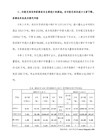
1. All of them went out for a walk ________ John.
A. besides B. except C. beside D. excepts
2. Everyone is here ________ Xiao Wang and me.
A. except B. besides C. beside D. excepts
需要强调的是except与exceptfor的用法区别:
1)Except后排除的内容与主语往往是同一类的,而exceptfor后所排除的内容与主语往往不是同一类的。例如,试比较:
All the buildings are excellent except this one.
All the buildings are excellent except for their location或者All the buildings are excellent except that the place on which the buidings are built is notgood.
⑨ I can answer all the questions except for the last one. 除了最后一题外,所有题目我都可以解答。
⑩ Your writing is good except for a few grammar mistakes. 除了几处语法错误外,你的作文写得很好。
A. except that B. except for
C. besides D. beside
析:Key: 1. A 2. B。因为除去的与保留的"不是同类项",故选except for。
except在python中的用法

except在python中的用法在Python中,`except`用于捕获和处理异常。
它通常与`try`一起使用,形成异常处理的代码块。
以下是`except`的一般语法:```try:# 可能引发异常的代码except ExceptionType:# 异常处理代码```在这个语法中,`try`代码块包含了可能会引发异常的代码。
如果在`try`代码块中引发了指定类型的异常(`ExceptionType`),则执行相应的`except`代码块来处理异常。
以下是一些常见的`except`的用法示例:1. 捕获所有类型的异常:```pythontry:# 可能引发异常的代码except:# 异常处理代码```这种情况下,不指定具体的异常类型,`except`将捕获所有类型的异常。
2. 捕获多个异常类型:```pythontry:# 可能引发异常的代码except (ExceptionType1, ExceptionType2):# 异常处理代码```在括号中指定多个异常类型,如果引发的异常类型在列表中,则执行相应的`except`代码块。
3. 捕获特定类型的异常:```pythontry:# 可能引发异常的代码except ExceptionType:# 异常处理代码```在`except`后指定特定的异常类型,只有当引发的异常类型与指定的类型匹配时,才执行相应的`except`代码块。
4. 捕获异常对象:```pythontry:# 可能引发异常的代码except ExceptionType as e:# 使用异常对象进行处理```通过`as`关键字将引发的异常赋值给变量`e`,可以在`except`代码块中使用该变量来访问异常对象的信息。
5. 捕获所有异常类型并打印错误信息:```pythontry:# 可能引发异常的代码except Exception as e:print("An error occurred:", str(e))```这种情况下,异常对象的信息被转化为字符串并打印出来。
except except for beside的区别

except except for beside的区别摘要:1.引言:except,except for,beside的区别2.except的使用场景3.except for的使用场景4.beside的使用场景5.结论:根据语境选择合适的词汇正文:在日常英语写作和口语中,except,except for和beside这三个短语都有排除或除外的意思,但它们的用法和含义略有不同。
在这里,我们将详细介绍这三个短语的区别以及它们的用法。
首先,我们来看except。
except用于从整体中排除某个或某些部分,表示例外。
例如:“我喜欢所有的水果,except(排除)香蕉。
”(I like all fruits except bananas.)在这个例子中,except表示香蕉是个例外,其他水果都是我喜欢的。
接下来是except for。
except for与except类似,也表示排除或除外,但它更强调对某个整体中的小范围进行排除。
例如:“这个房子的价格除了地理位置除外,其他都很满意。
”(The price of this house is everything except for the location.) 在这个例子中,except for表示除了地理位置之外,其他方面都很满意。
最后是beside。
beside的意思是“在旁边”,并不表示排除或除外。
例如:“公园里的花坛beside the tree。
”(The flower bed is beside the tree.)在这个例子中,beside the tree表示花坛在树的旁边。
总之,except,except for和beside这三个短语在用法和含义上有所不同。
except和except for用于表示排除或除外,但except for更强调对整体中的小范围进行排除;而beside表示“在旁边”,并不表示排除或除外。
except和except for
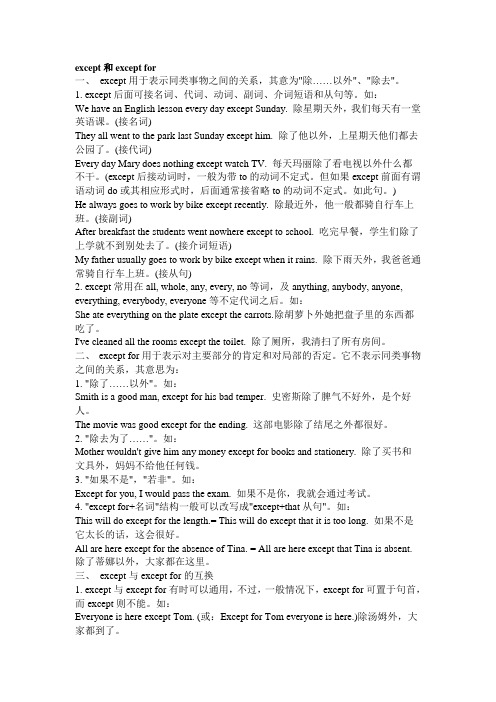
except和except for一、except用于表示同类事物之间的关系,其意为"除……以外"、"除去"。
1. except后面可接名词、代词、动词、副词、介词短语和从句等。
如:We have an English lesson every day except Sunday. 除星期天外,我们每天有一堂英语课。
(接名词)They all went to the park last Sunday except him. 除了他以外,上星期天他们都去公园了。
(接代词)Every day Mary does nothing except watch TV. 每天玛丽除了看电视以外什么都不干。
(except后接动词时,一般为带to的动词不定式。
但如果except前面有谓语动词do或其相应形式时,后面通常接省略to的动词不定式。
如此句。
)He always goes to work by bike except recently. 除最近外,他一般都骑自行车上班。
(接副词)After breakfast the students went nowhere except to school. 吃完早餐,学生们除了上学就不到别处去了。
(接介词短语)My father usually goes to work by bike except when it rains. 除下雨天外,我爸爸通常骑自行车上班。
(接从句)2. except常用在all, whole, any, every, no等词,及anything, anybody, anyone, everything, everybody, everyone等不定代词之后。
如:She ate everything on the plate except the carrots.除胡萝卜外她把盘子里的东西都吃了。
I've cleaned all the rooms except the toilet. 除了厕所,我清扫了所有房间。
- 1、下载文档前请自行甄别文档内容的完整性,平台不提供额外的编辑、内容补充、找答案等附加服务。
- 2、"仅部分预览"的文档,不可在线预览部分如存在完整性等问题,可反馈申请退款(可完整预览的文档不适用该条件!)。
- 3、如文档侵犯您的权益,请联系客服反馈,我们会尽快为您处理(人工客服工作时间:9:00-18:30)。
表示“除了…以外”的介词besides, except, except for, but, apart from 等。
1) besides 表示“除…以外,(还,也)”,相当于in addition to.
Besides English, they also study math, physics and chemistry
除了英语以外,他们还学习数学,物理和化学。
注意: 不要将besides和beside 混淆。
beside是“在…旁边”的意思。
2) except 表示“除…外,(其余都)…”,常与all,every,no, none, nothing 等含有整体肯定或否定意义的词连用。
except 是英语中少数用法最为活跃的介词之一, 其后除了可跟名(代)词外,还可跟另一介词短语、动词不定式短语或that 引导的从句。
例如:
He answered all the questions except the last one.
除了最后一个问题外,所有的问题他都回答了。
I went nowhere except to the library.
除了图书馆以外,我哪儿都没有去。
试比较:
We all went except him. 除了他(没去)以外,我们都去了。
Three others also went besides him. 除了他(去了)以外,还去了三个人。
[注] except 与except for区别
except for 也表示“除…以外”,但是和except 不同的是:
与except 连用的整体词和except 所跟的词常是同类的,是指整体除去一部份; 而与except for 连用的整体词与except for 所跟的词往往不是同类的,是指整体中除去一个细节。
例如:
He answered all the questions except the last one.
除了最后一个问题外,所有的问题他都回答了。
I went nowhere except to the library.
除了图书馆以外,我哪儿都没有去。
Your composition is good except for a few spelling mistakes.
除了几处拼写错误以外,你的作文写得很好。
Except for an old lady, the bus was empty.
除了有一个老太太以外,这辆公共汽车是空的。
3) apart from 表示“除…之外”。
根据上、下文的不同,它既可用作besides, 也可用作except 和except for。
例如:
Apart from them, I had no one to talk to. (= except)
除了他们以外,我没有人说话。
Apart from other considerations, time is also a factor. (=besides)
除了别的考虑之外,时间也是一个因素。
(It is) Good work apart from a few slight faults. (= except for)除了几个小毛病以外,这是一篇佳作。
